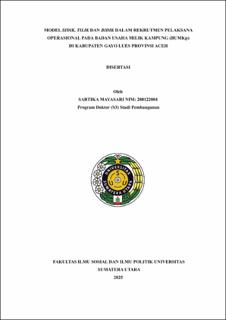Model Sidik, Tilik dan Bidik dalam Rekrutmen Pelaksana Operasional pada Badan Usaha Milik Kampung (BUMKp) di Kabupaten Gayo Lues Provinsi Aceh
The Sidik, Tilik, and Bidik Model in Recruitment of Operational Executors in Village-Owned Enterprises (BUMKp) in Gayo Lues Regency, Aceh Province

Date
2025Author
Mayasari, Sartika
Advisor(s)
Harahap, R Hamdani
Badaruddin
Daulay, Harmona
Metadata
Show full item recordAbstract
A BUMKP is a business entity whose capital is wholly or largely owned by the village through direct participation from village assets that are separated to manage assets, services, and other businesses for the greatest welfare of the village community. Recruitment for operational executors in Gayo Lues Regency has never been conducted, resulting in suboptimal BUMKP implementation. Gayo Lues customs, such as SIDIK, TILIK, and BIDIK (Sitilik), have existed and developed within the Gayo Lues community for a long time, and this term can be used to refer to recruitment. The research method used was qualitative. This study was descriptive, emphasizing the need to explore various ideas and recruitment models for BUMKp operational implementers so they could be implemented. The purpose of this study was to identify and analyze the implementation, explain community perspectives, and analyze the "Sidik, Tilik, Bidik" model within the Gayo Lues community. The research was conducted in several villages selected based on the results of the Village Development Index in Gayo Lues Regency, Aceh Province. The research results show that the Gayo Lues community's view of "Sidik, Tilik, and Bidik" in the recruitment of BUMKp operational implementers in Gayo Lues Regency is not unfamiliar, especially to Gayo Lues traditional leaders.
The research analysis further indicates that the "Sidik, Tilik, and Bidik" (sitilik) model includes components consisting of a selection committee, which is the result of deliberations by local elites such as mukim heads and opat leaders, applying the principles of good corporate governance. Therefore, this model should produce operational implementers who possess a reliable, competent, and competitive entrepreneurial spirit.
